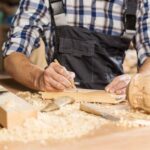What tools should start a woodworker’s garage? Having the right tools is crucial for any woodworking enthusiast, whether you are a beginner or an experienced craftsman. The success of your projects often depends on the quality and variety of tools you have at your disposal. This article will provide valuable insights into the essential tools every woodworker should have in their garage, from power tools to hand tools, specialty equipment, and safety gear.
When it comes to woodworking, having the right tools can make all the difference in the quality of your finished projects. Whether you are building furniture, crafting intricate designs, or simply enjoying the art of woodworking as a hobby, having the proper tools is essential for precision and efficiency.
In this article, we will explore the must-have power tools such as a table saw, miter saw, and drill press. We will also discuss essential hand tools like chisels, hand planes, and clamps that every woodworker should have in their arsenal.
Additionally, we will delve into additional must-have tools such as routers, bandsaws, and jigsaws, as well as specialty equipment for advanced woodworking techniques. Lastly, we will touch on the importance of proper tool storage and organization, as well as safety equipment to ensure a safe and successful woodworking journey.
Essential Power Tools for Woodworking
Having the right power tools is essential for any woodworking enthusiast looking to set up their garage workshop. Three power tools that every woodworker should have in their arsenal are the table saw, miter saw, and drill press.
The table saw is a versatile tool that allows for precise and accurate cuts on large pieces of wood, making it a must-have for any woodworking project. The miter saw is perfect for cutting angles and making crosscuts, while the drill press is essential for creating perfectly straight holes in various types of wood.
A quality table saw can cost anywhere from $300 to $2000, depending on its features and capabilities. Some popular brands to consider when purchasing a table saw include DEWALT, Bosch, and SawStop.
When it comes to miter saws, prices can range from $150 to $800, with top brands such as Makita, Milwaukee, and Hitachi offering reliable options. As for drill presses, you can find models priced between $100 and $1000, with trusted manufacturers like WEN and Jet offering a wide range of options for woodworkers of all skill levels.
In addition to these essential power tools, it’s important to invest in high-quality blades and accessories that will complement your woodworking equipment. A sturdy workbench with ample workspace and reliable clamps should also be considered as part of your power tool setup. By prioritizing these key items when setting up your garage workshop, you can ensure that you have the necessary tools to tackle a wide variety of woodworking projects effectively.
| Power Tool | Price Range | Popular Brands |
|---|---|---|
| Table Saw | $300 – $2000 | DEWALT, Bosch, SawStop |
| Miter Saw | $150 – $800 | Makita, Milwaukee, Hitachi |
| Drill Press | $100 – $1000 | WEN, Jet |
Hand Tools Every Woodworker Should Have
As a woodworker, it is crucial to have the right tools in your garage to ensure efficiency, precision, and safety in your woodworking projects. While power tools may be the first thing that comes to mind when setting up a woodworking garage, hand tools are equally essential for achieving fine details and intricate craftsmanship. Here are some hand tools that every woodworker should have:
- Chisels: Chisels come in various shapes and sizes and are used for carving, shaping, and detailing wood. A set of high-quality chisels with sharp edges is essential for creating mortise and tenon joints, carving patterns, and smoothing surfaces.
- Hand Planes: Hand planes are indispensable for smoothing rough lumber, flattening surfaces, and shaping wood. Investing in a block plane, jack plane, and smoothing plane will give you versatility in achieving different finishes and dimensions in your woodworking projects.
- Clamps: Clamps are necessary for holding pieces of wood together during glue-ups or while waiting for adhesive to dry. They come in various types such as bar clamps, pipe clamps, C-clamps, and spring clamps. Having a collection of clamps in different sizes will enable you to tackle a wide range of woodworking tasks with ease.
These hand tools play a significant role in refining the details of your woodworking projects that power tools may not be able to accomplish with the same level of precision. Whether you are working on joinery, shaping wood surfaces, or assembling intricate pieces together, having the right hand tools at your disposal is paramount.
In addition to chisels, hand planes, and clamps, other essential hand tools include marking gauges for accurate measurements, saws such as dovetail saws or coping saws for cutting complex shapes or joinery details by hand, as well as scrapers for smoothing surfaces. Building a collection of quality hand tools will not only enhance your woodworking capabilities but also contribute to the overall satisfaction of creating beautifully crafted wood pieces.
Additional Must-Have Tools
When setting up a woodworker’s garage, it’s important to have the right tools to ensure efficiency and precision in your projects. In addition to the essential power tools like the table saw, miter saw, and drill press, there are additional must-have tools that every woodworker should consider adding to their workshop. These tools include the router, bandsaw, and jigsaw, each serving specific purposes to enhance the quality of your woodworking projects.
A router is a versatile tool that can be used for a variety of tasks such as shaping edges, cutting grooves, and creating intricate designs on wood. Whether you’re working on cabinetry, furniture, or decorative pieces, a router can add decorative details and functionality to your woodworking projects. Additionally, a bandsaw is essential for making curved cuts and resawing lumber into thinner pieces.
Its versatility makes it a valuable addition to any woodworker’s garage. Lastly, a jigsaw is perfect for making detailed and intricate cuts that may be challenging with other power tools. Its maneuverability allows for more creativity and precision in woodworking projects.
Investing in these additional must-have tools will not only expand your capabilities as a woodworker but also open up new possibilities for creativity in your projects. With the right tools at your disposal, you’ll be able to tackle a wider range of woodworking tasks with confidence and precision.
Specialty Tools for Advanced Woodworking
For woodworkers looking to take their craft to the next level, having specialty tools for advanced woodworking is essential. These tools can help create intricate and detailed designs, as well as add a unique touch to your woodworking projects. From creating precise joints to shaping and turning wood, here are some specialty tools that every advanced woodworker should consider adding to their garage workshop.
Dovetail Jig
One of the hallmarks of fine woodworking is the ability to create clean and precise dovetail joints. A dovetail jig is an essential tool for achieving this. Whether you are making drawers, boxes, or furniture, a dovetail jig allows you to cut evenly spaced pins and tails with ease, resulting in strong and visually appealing joints. With a quality dovetail jig, woodworkers can elevate the craftsmanship of their projects and add a touch of elegance to their work.
Lathe
A lathe is a versatile tool that allows woodworkers to turn wooden pieces into custom shapes, designs, and patterns. This tool is commonly used for creating table legs, spindles, bowls, and decorative elements such as finials and knobs.
Investing in a lathe opens up endless possibilities for creativity in woodworking, allowing artisans to add unique details and textures to their projects. With skillful use of a lathe, woodworkers can take their craft to the next level by incorporating turned elements into their work.
Spokeshave
For shaping concave or convex surfaces on wood, a spokeshave is an invaluable tool for any advanced woodworker’s arsenal. It allows for precise shaping and smoothing of curved edges and contours without the need for sanding or scraping by hand.
Whether working on chair legs, handles, or curved components of furniture or musical instruments, a spokeshave provides control and accuracy in shaping intricate details on wooden pieces. This specialized hand tool enables woodworkers to achieve smooth finishes and refined shapes in their woodworking projects.
In order to take your woodworking skills to new heights with these advanced specialty tools, it’s important to invest in high-quality equipment that will deliver precision and reliability in your craftsmanship. From creating intricate joinery with a dovetail jig to turning custom shapes on a lathe or shaping contoured surfaces with a spokeshave, these specialty tools are indispensable for elevating the artistry of woodworking projects.
Tool Storage and Organization
When starting a woodworking garage, it’s not just important to have the right tools, but also to have an organized and efficient space to work in. Here are some tips for keeping your garage workshop tidy and efficient:
1. Invest in good quality tool storage: Having the right storage for your tools is essential for keeping your workshop organized. Consider getting a tool chest or cabinet to store your hand tools, and shelving units or a wall-mounted tool rack for your power tools.
2. Utilize pegboards or French cleats: Utilizing wall space can help keep your tools easily accessible while also freeing up valuable workspace. Pegboards or French cleats are great options for hanging hand tools, small power tools, and other accessories.
3. Keep a clean workspace: Regularly cleaning and organizing your workspace is crucial for efficiency and safety. Make it a habit to put away tools after each use, sweep the floors, and wipe down surfaces to prevent sawdust buildup.
4. Label everything: To avoid spending unnecessary time searching for specific tools or supplies, consider labeling all bins, drawers, and containers where you store your woodworking materials. This simple step can save you time in the long run.
5. Create designated zones: Organize your workshop by creating designated areas for different tasks such as cutting, sanding, assembly, and finishing. This will not only keep things orderly but will also help streamline your workflow.
By following these tips for tool storage and organization, you can create an efficient and tidy garage workshop that will enhance your overall woodworking experience.
Remember that having the right storage solutions is just as important as having the right tools when it comes to starting a woodworker’s garage.
Safety Equipment for Woodworking
When setting up a woodworking garage, it’s essential to prioritize safety by investing in the right protective gear, dust collection tools, and a first aid kit. Woodworking can involve exposure to various hazards such as flying wood chips, loud noise from power tools, and the potential for cuts and scrapes. Therefore, having the appropriate safety equipment is crucial to prevent accidents and ensure a safe working environment.
Protective gear such as safety goggles, ear protection, and a respirator are essential for woodworkers. Safety goggles protect your eyes from flying debris or sawdust that can cause serious eye injuries. Ear protection is necessary to prevent long-term damage from exposure to loud noise generated by power tools. A respirator helps filter out harmful particles from wood dust and fumes, protecting your lungs from respiratory issues.
In addition to personal protective gear, dust collection tools are vital in maintaining a clean and healthy workspace. Installing a dust collector or using a shop vacuum with a HEPA filter can help remove airborne particles that could pose health risks when inhaled.
Proper dust collection not only protects the woodworker but also contributes to keeping the workshop clean and organized. Finally, having a well-stocked first aid kit readily available in the woodworking garage is an essential precautionary measure in case of minor accidents or injuries.
| Woodworking Safety Equipment | Importance |
|---|---|
| Safety Goggles | Protection against eye injuries from flying debris |
| Ear Protection | Prevents hearing damage from loud power tool noise |
| Respirator | Filters out harmful particles from wood dust and fumes |
Budget-Friendly Alternatives
Starting a woodworking garage can be an expensive endeavor, especially when it comes to acquiring the necessary tools. However, there are budget-friendly alternatives that can help you get started without breaking the bank. By prioritizing essential tools and being strategic about your purchases, you can build up your woodworking arsenal gradually while still being able to create quality projects.
Consider Second-Hand Tools
One way to save money on woodworking tools is to consider purchasing second-hand equipment. Many woodworking enthusiasts upgrade their tools over time, leading to a surplus of well-maintained used tools on the market. Websites like Craigslist, Facebook Marketplace, and local online buy/sell groups can be great resources for finding quality used tools at a fraction of the cost of new ones.
DIY Tool Alternatives
For some tools, you may be able to create DIY alternatives rather than purchasing expensive brand-name versions. For example, instead of buying specialized jigs and fixtures for certain tasks, consider making your own from scrap wood or other materials. There are also numerous DIY plans available online for building your own workbenches and tool storage solutions that can save you money.
Shop Sales and Discounts
Keep an eye out for sales, discounts, and promotions at local hardware stores or online retailers. Many stores offer significant discounts during specific times of the year or have clearance sections where you can find discounted tools. Signing up for newsletters or loyalty programs with these stores can also provide access to exclusive deals and coupons that can help lower the cost of essential woodworking tools.
By being strategic with your purchases and considering alternative options, you can start a woodworking garage without breaking the bank. Remember that quality is important when it comes to tools, so prioritize investing in durable equipment that will last for years to come even if it means spending a little more upfront.
Conclusion
In conclusion, it is clear that having the right tools is essential for any woodworker looking to start their garage workshop. The tools mentioned in this article, from essential power tools to specialty and safety equipment, form the foundation of a well-equipped woodworking space. These tools not only make woodworking projects easier and more efficient but also contribute to the safety of the woodworker.
Investing in quality tools is crucial for a successful woodworking journey. While it may be tempting to opt for budget-friendly alternatives, it is important to remember that quality tools can make a significant difference in the outcome of your projects. They provide precision, durability, and reliability, ultimately leading to better results and increased satisfaction with your work. Quality tools also tend to last longer, saving you money in the long run by reducing the need for frequent replacements.
When starting a woodworker’s garage, it is important to prioritize the acquisition of these essential tools before delving into more specialized options. By carefully selecting and investing in high-quality power and hand tools, as well as safety equipment, woodworkers can lay a solid foundation for their woodworking endeavors. With proper tool storage and organization, along with a commitment to safety practices, woodworkers can create an efficient and enjoyable workspace where they can bring their woodworking visions to life.
Frequently Asked Questions
What Do I Need to Start a Wood Workshop?
To start a wood workshop, you will need a designated space for your shop, woodworking tools, safety equipment, workbenches, storage for materials and finished projects, and good lighting. It’s also important to have a solid understanding of basic woodworking techniques and safety procedures.
What Tools Are Needed to Begin Woodworking?
Some of the essential tools needed to begin woodworking include a saw (such as a table saw or circular saw), a drill and bits, chisels, measuring tools (like a tape measure and combination square), clamps, hammer, hand plane, and sandpaper.
As you progress in your skills and projects, you may find the need for more specialized tools such as router, jigsaw, or miter saw.
What Machines Do I Need in a Woodworking Shop?
In a woodworking shop, some necessary machines include a planer for smoothing rough lumber surfaces, jointer for creating straight edges on boards, band saw for cutting curves or irregular shapes in wood, wood lathe for turning wood stock into evenly shaped cylindrical pieces like table legs or spindles. Additionally, having a dust collection system is important to maintain cleanliness and air quality in the shop.
These machines can help in creating precise cuts and shaping wood in various ways to expand your project options.

Hi everyone! I’m a woodworker and blogger, and this is my woodworking blog. In my blog, I share tips and tricks for woodworkers of all skill levels, as well as project ideas that you can try yourself.





